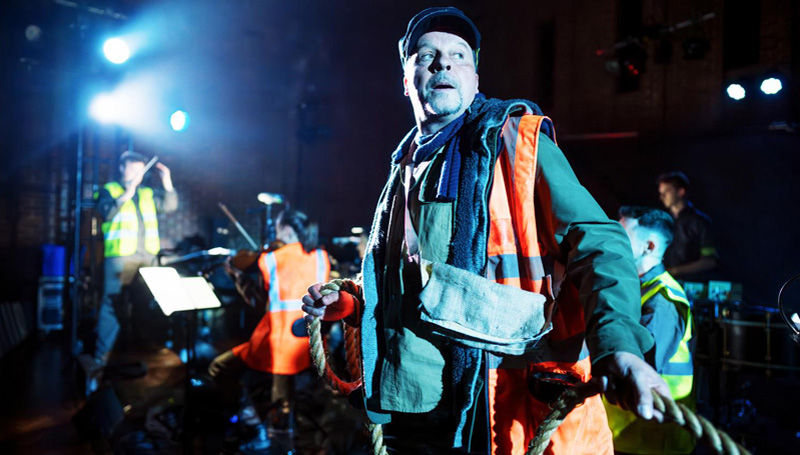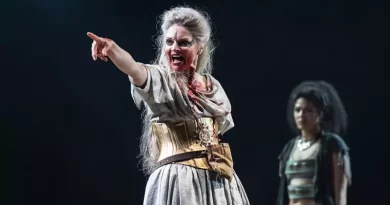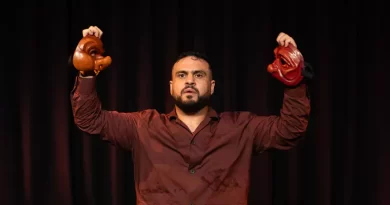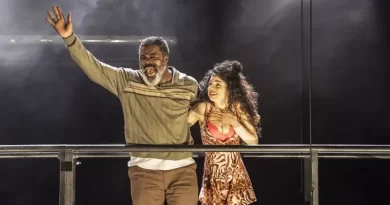“The Flying Dutchman” at Worthing Pavilion – OperaUpClose and Manchester Camerata
Simon Jenner in West Sussex
8 July 2023
At the end of his life Wagner announced he’d revise his early (1841) opera The Flying Dutchman but died first. I thought its baggy predecessor Rienzi was a better candidate. But OperaUpClose’s production, with the Manchester Camerata conducted by Timothy Burke, makes me think again: twice.
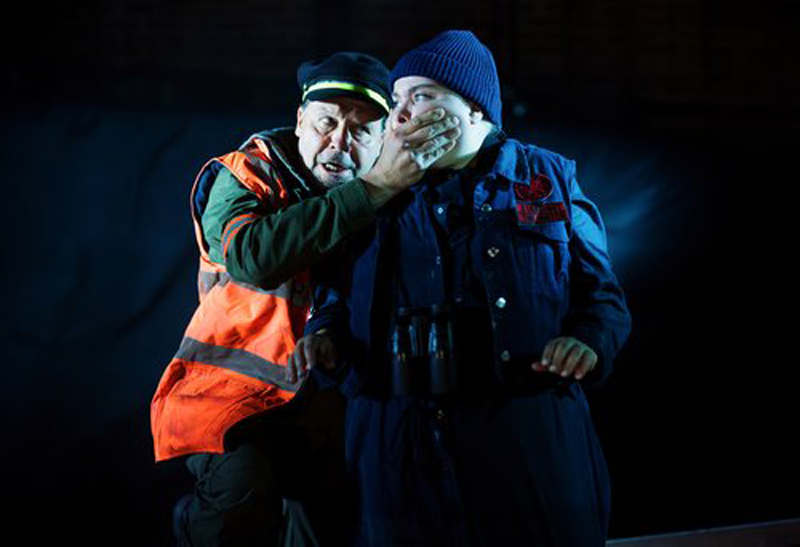
Photo credit: Alex Brenner.
Arriving at Worthing Pavilion (till 8th), it continues touring to London, Hull and Liverpool till July 23rd. Though conceived pre-lockdown, its new focus is uncanny: the violent prevention of immigrants’ landing (with a curious WAVE machine) has turned even more into a personal dream for some, a nightmare for millions.
Think twice, because for one thing, its orchestral reduction by Laura Bowler in association with Robin Wallington (directed by Lucy Bradley based on her original concept), and a newly imagined libretto by poet Glyn Maxwell, echoes recent musical revivals: like Craig Revel Horwood’s reworking of Sunset Boulevard (2016) where singers also play musical instruments; and some contemporary chamber operas. It’s also in the tradition of Schoenberg and Webern reducing classics from Bach to both Josef and Richard Strauss to palm-court-orchestra size. The Camerata play and sing with headlong brio and commitment, hunkered (like the singers) in sailors’ dark serge and Day-Glo jackets.
The other striking element is just how drawn-out the 50 minutes of Act Two is, which makes me wonder what Wagner might have revised here. Bowler clears an orchestral path, though – importantly – this opera isn’t cut except the overture (whose themes re-emerge like a nagging volcano, Wagner himself asking if we’ve forgotten something). Maxwell’s new storyline is the Wagner rewrite of the decade.
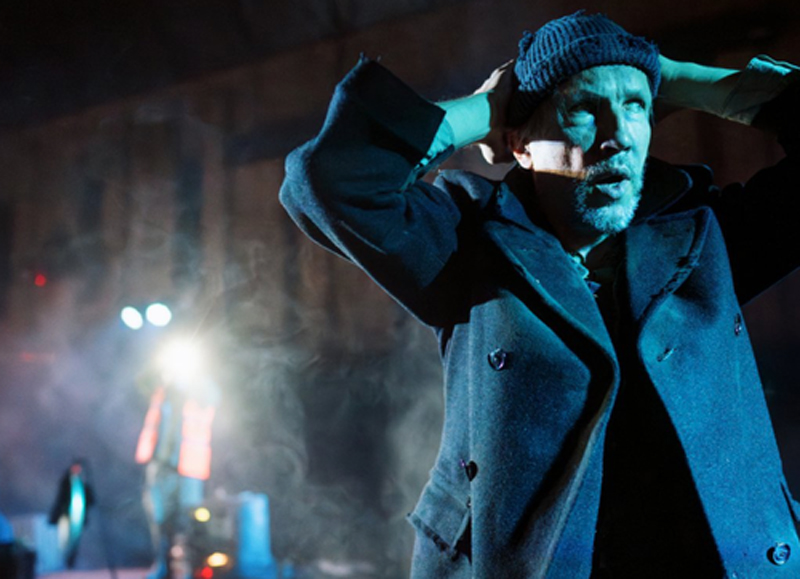
Photo credit: Alex Brenner.
It’s a thrilling concept. Players reduce to violins, cello, double bass, accordion (a mini-orchestra in itself), bass and standard clarinet doubled, also flute and piccolo, percussion (Japanese blocks and triangle prominent) and matching Wagner’s original sound, French horn: the whooping signature of the work; clean-ringing throughout. Watching the fluorescent-clad Camerata, led by Burke, singing with commitment, standing and playing and sitting down to do both is riveting.
The four soloists are all first-rate. Timothy Dawkins as the decent, sympathetic Captain Dee, not above being bribed, a gnarled lyric tenor. Carolyn Holt is both Dee’s sensitive lieutenant Helm, and (difficult to tell she’s a different character) Starlight’s ex-lover Mari, for Acts 2 and 3. Again finely characterized soprano singing from Holt: inhabiting a sour but plangent regret, surly and scorned. Though Holt needs to match Starlight in more than froward looks.
But this delicate interplay is more the fault of dramaturgy. Mari’s hard-line stance on refugees is sabotaged by Starlight’s great ballad with its octave-drop aria, turning the Watch (orchestral players singing) to sympathy. But the essential relationship between the women is shadowy. The orchestra needs fining down even further; something more drastic done with body language and key words.
The Dutchman now renamed Mariner (Pauls Putnins) is darkly resonant, cut-through and both inordinate and alone. Much of his sudden appearance under a tarp is lost in murky lighting, but Putnins etches a burnt soul: you can scent his appalled sense of his ambiguous trafficking past, his scouring look for redemption, his disbelief in Starlight’s tenderness as she bandages him. Here we get chemistry.
Putnins is rightly praised, though for me the great voice of the evening is Starlight (Philippa Boyle), Senta’s new name. Here is a voice that should be with the Royal Opera House or the ENO, but thankfully she’s in this exciting production, almost bringing her own lighting gantry with her cut-through soprano, soaring effortlessly and ringing through upper registers, a steely tessitura in the ballad, fined down to tenderness when (often) required with Putnins. Boyle alone is a great reason to see this production: a major singer whose future surely should make headlines, above-title.
The chorus is drawn from several community singers groups and pre-recorded: Bristol Old Vic, Blackpool Grand Theatre, Hull Freedom Chorus, London’s Grand Junction, and MAST Mayflower Studios in Southampton. All directed by Michael Betteridge and Lynsey Docherty. There’s great play with an old radio, tuning effects and narrator Neil Balfour too, mixing shipping to broadcast names familiar with everyone, with existential questions and narrative pushing the plot.
But there’s trouble with getting the story across and though some acting is wonderful (notably Boyle, Putnins too), there’s difficulty with lighting, with characterization. And if we weren’t served an A4 sheet with detailed plot summary (and excellent QR-readable programme if you can only get it), I doubt we would get the point: that the two sopranos were in a previous relationship – no intimacy, just tug-of-war – with Starlight now attracted by the illegally-landed Mariner.
Themes of biphobia and passion could emerge here too, and might if we could hear all the words. That we’re up close and can’t, despite the small orchestra, is a failure of dramaturgy. Themes of biphobia and betrayal (brought out effectively in Sap at Soho recently) would make Act 2, longest and least dramatic, far more engaging. The end of Act 3 too is ambiguous. Wagner shows his lovers transformed. Here – I’m not sure they know themselves.
How persuasive? I can never go back to the original after this without a sense of something lost. Wagner’s been modified in the guts of the living, the production’s rough edges can smooth to affirm this far more humane fable. It’s absolutely worth seeing, and in Boyle’s Starlight, more a star watched as she rises out of the sea.
.
.
~

